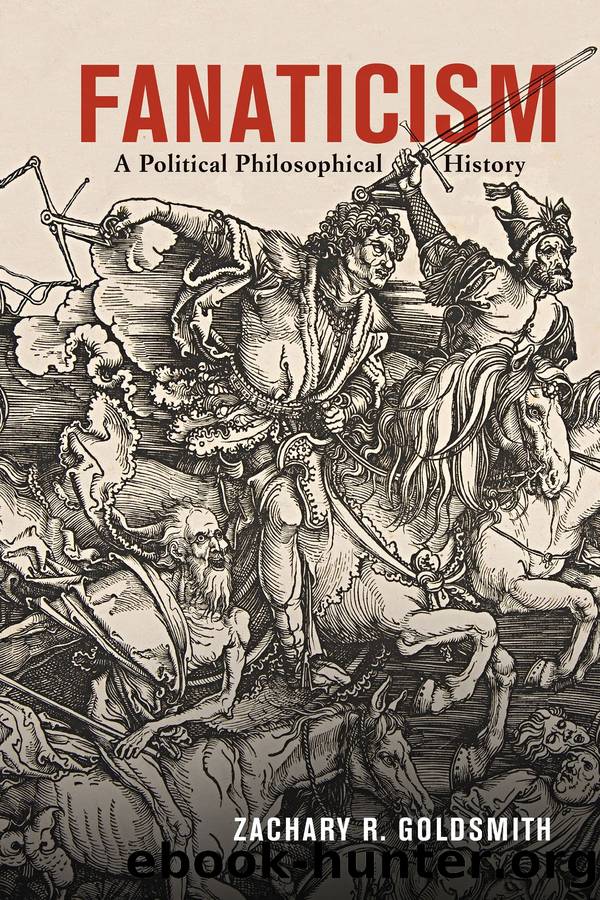Fanaticism by Zachary R. Goldsmith;

Author:Zachary R. Goldsmith;
Language: eng
Format: epub
ISBN: 9780812298628
Publisher: Lightning Source Inc. (Tier 2)
Published: 2022-03-01T00:00:00+00:00
Moderation: Another Antidote to Fanaticism
Despite the impression that might be given in the foregoing pages, Burkeâs writings on the French Revolution are not all shock, outrage, and opprobrium. Constantlyâand especially in his letters, including the Reflections, to his French friend DepontâBurke recommends an approach to politics altogether different from fanaticism: moderation. Burkeâs moving letter to Depont penned in November 1789 is itself a paean to the virtues of moderation. Burke (1992b) writes that âmoderation is a virtue, not only amiable but powerful.â He continues: âIt is a disposing, arranging, conciliating, cementing virtueâ (16). Such a virtue, Burke insists, is desperately needed in a country like France seeking to adopt a new constitution. Indeed, Burke arguesâwith reference to the French situationâthat, without it, âtheir acts will taste more of their power than of their wisdom, or their benevolence. Whatever they do will be in extremes; it will be crude, harsh, precipitateâ (16). Unlike fanaticism, moderation requires not prophecy but prudence, which Burke calls âthe first of virtuesâ in politics (15). A moderate approach to politics recognizes a âradical infirmity in all human contrivancesâ and therefore does not seek an elusive perfection in politics (15). Such an approach rejects perfectionism in politics as impossibleâand the purported means to achieve this utopian goal as always unacceptable. As Burke reminds us, âAn imperfect good is still a goodâ (15).
As Aurelian Craiutu (2012)âthe foremost theorist of the concept of moderationâobserves, moderation can be at least partially understood âas a superior form of âcivilityâ and an antithesis to all forms of monist politicsâ (5; cf. Carrese, 2016). Craiutu continues, âModerates refuse the posture of historical generalizations and predictions. Anti-perfectionists and fearful of anarchy, they endorse fallibilism as a middle way between radical skepticism and epistemological absolutism, and acknowledge the limits of political action and the imperfection of the human conditionâ (15). For this reason, the moderate is less a revolutionary than a modest reformer, one who seeks to trim the sails of our common ship only if and where appropriate. Those seeking potentially disruptive changes to our common mode of life must always keep foremost in their minds that in so doing they are dealing with âman in the concrete,â as Burke (1992b) tells us; âit is with common human life, and human actions, you are to be concernedâ (13). This central realization mandates, as Burke writes, that political actors âought not to be so fond of any political object, as not to think the means of compassing it a serious considerationâ (13). Further, to responsible political actors, Burke writes, you ought ânever [to] wholly separate in your mind the merits of any political question, from the men who are concerned in itâ (13). Indeed, the moderate not only recognizes the destructive consequences radical political action often entails in human terms but also its frequent futility in bringing about any positive changes. As Burke (1987) writes in his Reflections, âRage and frenzy will pull down more in half an hour than prudence, deliberation, and foresight can build up in a hundred yearsâ (147).
Download
This site does not store any files on its server. We only index and link to content provided by other sites. Please contact the content providers to delete copyright contents if any and email us, we'll remove relevant links or contents immediately.
The remains of the day by Kazuo Ishiguro(8961)
Tools of Titans by Timothy Ferriss(8359)
Giovanni's Room by James Baldwin(7313)
The Black Swan by Nassim Nicholas Taleb(7097)
Inner Engineering: A Yogi's Guide to Joy by Sadhguru(6782)
The Way of Zen by Alan W. Watts(6589)
Asking the Right Questions: A Guide to Critical Thinking by M. Neil Browne & Stuart M. Keeley(5751)
The Power of Now: A Guide to Spiritual Enlightenment by Eckhart Tolle(5741)
The Six Wives Of Henry VIII (WOMEN IN HISTORY) by Fraser Antonia(5493)
Astrophysics for People in a Hurry by Neil DeGrasse Tyson(5172)
Housekeeping by Marilynne Robinson(4433)
12 Rules for Life by Jordan B. Peterson(4298)
Double Down (Diary of a Wimpy Kid Book 11) by Jeff Kinney(4257)
The Ethical Slut by Janet W. Hardy(4235)
Skin in the Game by Nassim Nicholas Taleb(4232)
Ikigai by Héctor García & Francesc Miralles(4229)
The Art of Happiness by The Dalai Lama(4118)
Skin in the Game: Hidden Asymmetries in Daily Life by Nassim Nicholas Taleb(3986)
Walking by Henry David Thoreau(3948)
